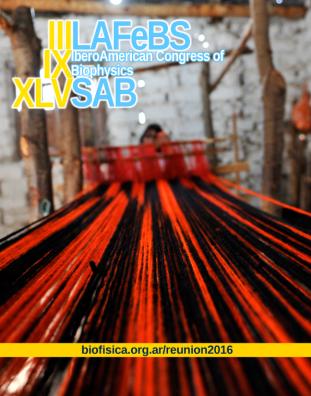Mostrar el registro sencillo del ítem
dc.contributor.author
Fabiani, Camila

dc.contributor.author
Corradi, Jeremias

dc.contributor.author
Murray, Ana Paula

dc.contributor.author
Antollini, Silvia Susana

dc.contributor.other
Sica, Mauricio Pablo

dc.date.available
2024-03-13T09:33:31Z
dc.date.issued
2016
dc.identifier.citation
Dual effect of acetylcholinesterase inhibitor on the nicotinic acetylcholine receptor; III Latin American Federation of Biophysical Societies; IX IberoAmerican Congress of Biophysics; XLV Reunion Anual Sociedad Argentina de Biofísica; Tucumán; Argentina; 2016; 250-251
dc.identifier.uri
http://hdl.handle.net/11336/230259
dc.description.abstract
Cholinergic deficit is regarded as an important factor responsible for Alzheimer’s disease symptoms. One of the molecular targets for the treatment of this disease is acetylcholinesterase (AChE), an enzyme that hydrolyzes acetylcholine at the synaptic cleft. It has been shown that some AChE inhibitors also act at nicotinic receptors (nAChR) potentiating their therapeutic effect. We found that metabolic extracts of Camellia sinensis (red tea) exhibit a strong anticholinesterase activity. By chromatography and NMR spectroscopy we found that caffeine was the active compound exerting such effect. We next explored if caffeine has a direct effect on the nAChR. Using the AChR conformationalsensitive probe crystal violet (CrV), an AChR open channel blocker, and AChR-rich membranes from Torpedo californica, we observed that increasing concentrations of caffeine (10-300 µM) decreased the KD of CrV in the resting state without changes in the KD in the desensitized state. In the presence of α-bungarotoxin, a specific AChR competitive antagonist, a dual effect was evident: low concentrations of caffeine did not produce any effect in the KD of CrV in the resting state, whereas higher concentrations produce a great increase of this value compatible with a competition with CrV for its site on the channel pore. To confirm this, we performed single channel recordings in Bosc cells expressing the adult muscle nAChR in the presence of 30 µM ACh and increasing concentrations of caffeine (150-20000 µM). We found that the mean open duration decreases, and the relative area of the briefer closed component and the cluster duration increase as a function of caffeine concentration. All these observations are compatible with an open channel blocker. Thus, our results suggest a dual effect of caffeine on the muscle AChR: at low concentrations, in the absence of agonist, induces an AChR conformational change, whereas at high concentrations caffeine acts as an AChR open channel blocker.
dc.format
application/pdf
dc.language.iso
eng
dc.publisher
Sociedad Argentina de Biofísica
dc.rights
info:eu-repo/semantics/openAccess
dc.rights.uri
https://creativecommons.org/licenses/by-nc-sa/2.5/ar/
dc.subject
NICOTINIC
dc.subject
RECEPTORS
dc.subject
MODULATION
dc.subject.classification
Biofísica

dc.subject.classification
Ciencias Biológicas

dc.subject.classification
CIENCIAS NATURALES Y EXACTAS

dc.title
Dual effect of acetylcholinesterase inhibitor on the nicotinic acetylcholine receptor
dc.type
info:eu-repo/semantics/publishedVersion
dc.type
info:eu-repo/semantics/conferenceObject
dc.type
info:ar-repo/semantics/documento de conferencia
dc.date.updated
2024-03-08T15:29:27Z
dc.journal.pagination
250-251
dc.journal.pais
Argentina

dc.journal.ciudad
Buenos Aires
dc.description.fil
Fil: Fabiani, Camila. Consejo Nacional de Investigaciones Científicas y Técnicas. Centro Científico Tecnológico Conicet - Bahía Blanca. Instituto de Investigaciones Bioquímicas de Bahía Blanca. Universidad Nacional del Sur. Instituto de Investigaciones Bioquímicas de Bahía Blanca; Argentina. Universidad Nacional del Sur. Departamento de Biología, Bioquímica y Farmacia; Argentina
dc.description.fil
Fil: Corradi, Jeremias. Consejo Nacional de Investigaciones Científicas y Técnicas. Centro Científico Tecnológico Conicet - Bahía Blanca. Instituto de Investigaciones Bioquímicas de Bahía Blanca. Universidad Nacional del Sur. Instituto de Investigaciones Bioquímicas de Bahía Blanca; Argentina. Universidad Nacional del Sur. Departamento de Biología, Bioquímica y Farmacia; Argentina
dc.description.fil
Fil: Murray, Ana Paula. Consejo Nacional de Investigaciones Científicas y Técnicas. Centro Científico Tecnológico Conicet - Bahía Blanca. Instituto de Química del Sur. Universidad Nacional del Sur. Departamento de Química. Instituto de Química del Sur; Argentina
dc.description.fil
Fil: Antollini, Silvia Susana. Consejo Nacional de Investigaciones Científicas y Técnicas. Centro Científico Tecnológico Conicet - Bahía Blanca. Instituto de Investigaciones Bioquímicas de Bahía Blanca. Universidad Nacional del Sur. Instituto de Investigaciones Bioquímicas de Bahía Blanca; Argentina. Universidad Nacional del Sur. Departamento de Biología, Bioquímica y Farmacia; Argentina
dc.relation.alternativeid
info:eu-repo/semantics/altIdentifier/url/https://biofisica.org.ar/reuniones-cientificas/reunionsab-previas/
dc.conicet.rol
Autor

dc.conicet.rol
Autor

dc.conicet.rol
Autor

dc.conicet.rol
Autor

dc.coverage
Internacional
dc.type.subtype
Congreso
dc.description.nombreEvento
III Latin American Federation of Biophysical Societies; IX IberoAmerican Congress of Biophysics; XLV Reunion Anual Sociedad Argentina de Biofísica
dc.date.evento
2016-11-23
dc.description.ciudadEvento
Tucumán
dc.description.paisEvento
Argentina

dc.type.publicacion
Book
dc.description.institucionOrganizadora
Sociedad Argentina de Biofísica
dc.source.libro
III Latin American Federation of Biophysical Societies; IX IberoAmerican Congress of Biophysics; XLV Reunion Anual Sociedad Argentina de Biofísica
dc.date.eventoHasta
2016-01-25
dc.type
Congreso
Archivos asociados
